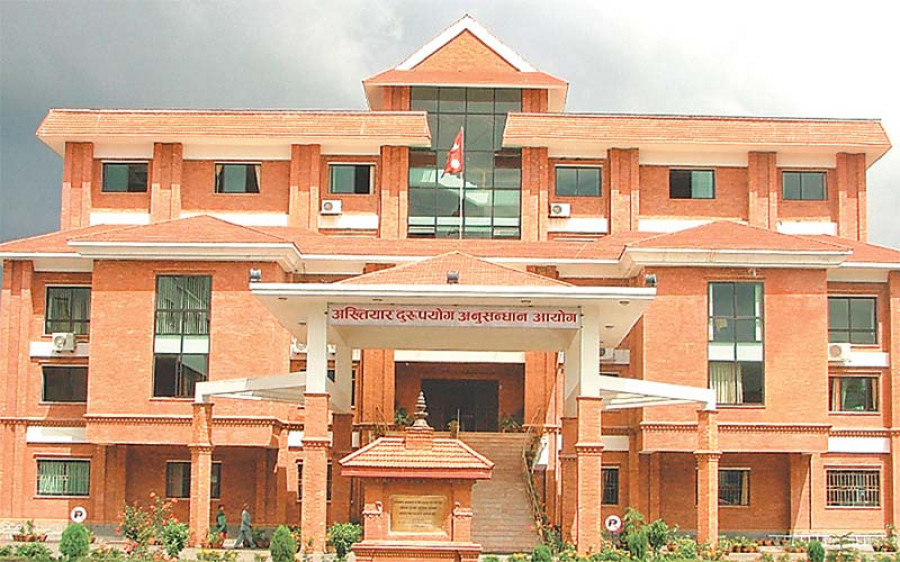National
Anti-graft body wants anti-money laundering department under it
Commission for Investigation of Abuse of Authority says corruption and money laundering are interlinked.
Prithivi Man Shrestha
The Commission for Investigation of Abuse of Authority has suggested that the government make legal provisions to bring the Department of Money Laundering under its purview.
While the commission has the mandate to investigate corruption committed by public officials, it is under the department’s scope to investigate the use of funds by anybody through criminal activities such as corruption, smuggling, and organised crimes.
The department is currently under the Prime Minister’s Office.
“There is a possibility of public officials connected with irregularities and corruption in private entities, cooperatives and national and international non-governmental organisations. So, the Department of Money Laundering Investigation should be brought under the commission.” states the commission’s 81-point suggestion to the government made public at a press meet on Monday.
Pradeep Koirala, spokesperson for the commission, said the suggestion was aimed at bringing the private sector under the purview of the anti-graft agency as per Nepal’s commitment to the United Nations Convention against Corruption.
Nepal is a signatory to this convention which calls for preventive measures and criminalisation of the most prevalent forms of corruption in the public and private sectors.
“There has been sharing of information between the commission and the department as per the memorandum of understanding signed between the two last year,” said Koirala. “But we have yet to conduct any joint investigation.”
According to Koirala, the department has been providing information about public officials who are potentially engaged in corrupt practices and the commission has been providing details about people from the private sector who are potentially engaged in money laundering.
In order to strengthen the role of the department, the government had brought it under the Prime Minister Office in February 2018 from the purview of the Finance Ministry.
In other suggestions, the commission has asked the government to clearly define policy decision and administrative decision of the Cabinet, as the Commission for Investigation of Abuse of Authority Act bars the commission from investigating policy decisions made by the Cabinet.
Currently, there is a tradition of taking controversial issues related to public procurement to the Cabinet for a decision, which the commission believes should not be categorised as a policy decision.
“There should be a clear definition of a policy decision,” the commission’s suggestion report said. “A working procedure should be formulated regarding the threshold of policy and adminstrative decisions of the Cabinet.”
A number of reports have suggested that the govenrment is preparing to introduce a bill on the commission that would bar the commission from investigating any Cabinet decision by revising the draft of the proposed bill.
The commission had long ago sent the drafts of two bills—Bill to Amend Corruption Prevention Act and Bill to Amend Commission for Investigation of Abuse of Authority Act. Both are yet to be presented at the federal parliament.
The commission has also called for new laws on the safety of witnesses, experts and informants and for controlling conflict of interests.
The commission also reiterated its demand that it be reassigned the task of investigating improper conduct by public officials.
Since the new constitution bars the commission from looking into “improper conduct”, there is no agency that is responsible for looking into such cases.
“Improper conduct and corruption are interlinked. During corruption investigation, improper conduct can be identified and corruption can be seen during investigation into improper conduct,” said Koirala.
The commission has filed 351 corruption cases at the Special Court in the last fiscal year 2018-19, the largest number of cases filed in a single year.
Of them, 147 cases were related to graft, 88 to fake academic certificates, 39 to damage of public properties, 33 to illegal benefits, 10 to revenue misappropriation and 12 to amassing illegal property. Twenty-two cases were categorised under miscellaneous.
In the last fiscal year, the success rate for the commision in corruption cases filed at the Special Court was 88.24 up from 67.82 percent in the fiscal year 2017-18.




 14.24°C Kathmandu
14.24°C Kathmandu















